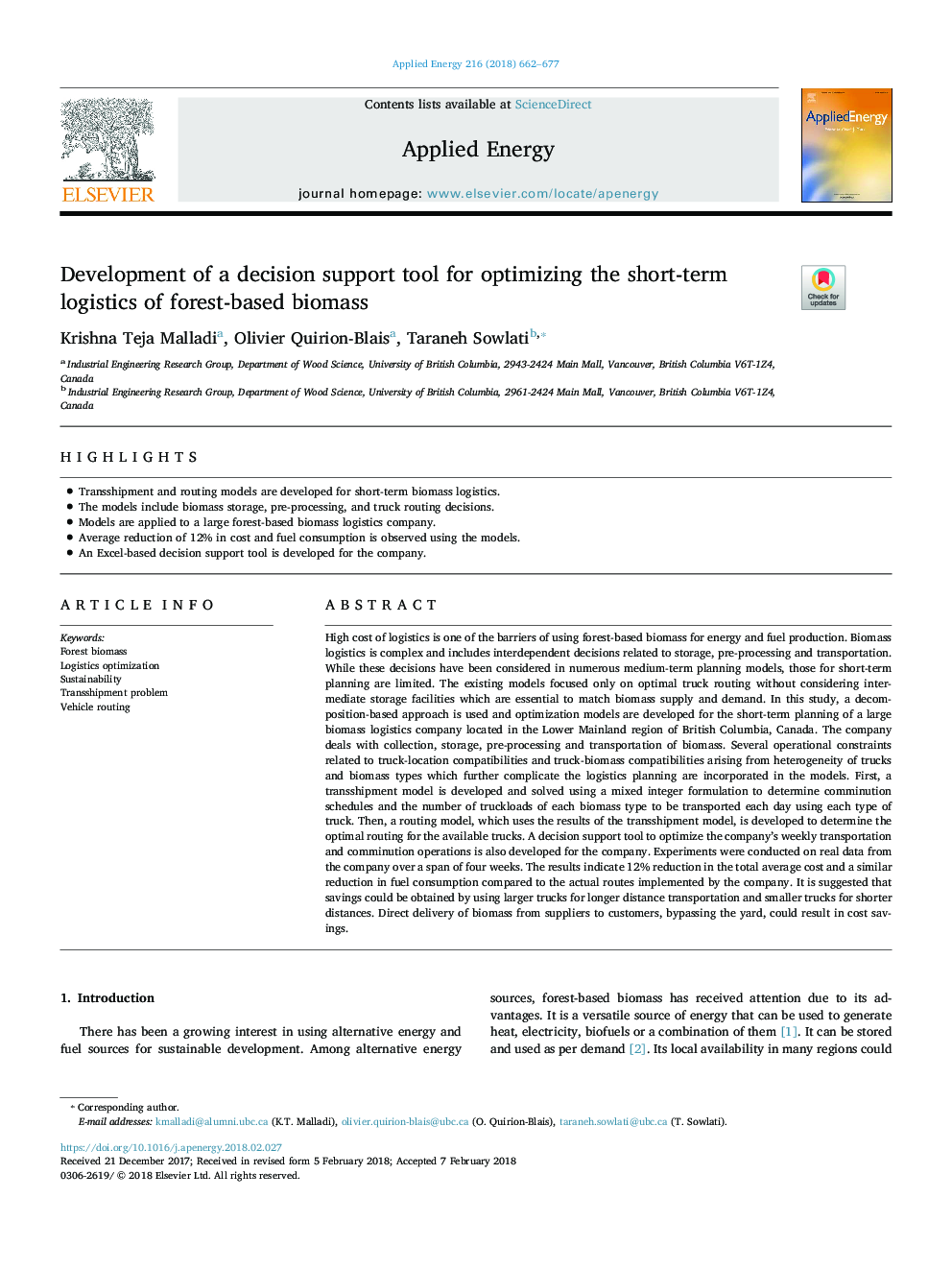| کد مقاله | کد نشریه | سال انتشار | مقاله انگلیسی | نسخه تمام متن |
|---|---|---|---|---|
| 6680633 | 1428074 | 2018 | 16 صفحه PDF | دانلود رایگان |
عنوان انگلیسی مقاله ISI
Development of a decision support tool for optimizing the short-term logistics of forest-based biomass
ترجمه فارسی عنوان
توسعه یک ابزار پشتیبانی تصمیم برای بهینه سازی تدارکات کوتاه مدت از زیست توده های جنگلی
دانلود مقاله + سفارش ترجمه
دانلود مقاله ISI انگلیسی
رایگان برای ایرانیان
کلمات کلیدی
زیست توده جنگل، بهینه سازی لجستیک، پایداری، مشکل حمل و نقل، مسیریابی خودرو،
ترجمه چکیده
هزینه بالای تدارکات یکی از موانع استفاده از زیست توده با استفاده از جنگل برای تولید انرژی و سوخت است. تدارکات زیست توده پیچیده است و شامل تصمیمات متقابل مربوط به ذخیره سازی، پیش پردازش و حمل و نقل می شود. در حالی که این تصمیمات در چندین مدل برنامه ریزی متوسطه در نظر گرفته شده است، کسانی که برای برنامه ریزی کوتاه مدت محدود هستند. مدل های موجود تنها بر روی مسیریابی کامیون مطلوب تمرکز کرده اند بدون توجه به امکانات نگهداری متوسط که برای تامین و تقاضای زیست توده ضروری است. در این مطالعه، یک روش مبتنی بر تجزیه استفاده شده است و مدل های بهینه سازی برای برنامه ریزی کوتاه مدت یک شرکت تدارکات زیست توده بزرگ واقع در منطقه پایین ترین سرزمین اصلی بریتیش کلمبیا کانادا طراحی شده است. این شرکت با جمع آوری، ذخیره سازی، پیش پردازش و حمل و نقل زیست توده مشغول به کار است. چندین محدودیت عملیاتی مربوط به سازگاری محل سکونت کامیون و سازگاری کامیون با زیست توده ناشی از ناهمگونی کامیون ها و انواع زیست توده است که پیچیده تر کردن برنامه ریزی تدارکات در مدل ها گنجانده شده است. اول، یک مدل حمل و نقل توسعه داده شده و با استفاده از یک فرمول عدد صحیح مختلط برای تعیین برنامه های خرد کردن و تعداد بارهای کامیون هر نوع زیست توده که هر روز با استفاده از هر نوع کامیون حمل می شود، حل می شود. سپس یک مدل مسیریابی که از نتایج مدل حمل و نقل استفاده می کند، برای تعیین مسیریابی مطلوب برای کامیون های موجود طراحی شده است. ابزار پشتیبانی تصمیم برای بهینه سازی عملیات حمل و نقل و حمل و نقل در هفتگی شرکت نیز برای این شرکت توسعه یافته است. آزمایشات بر روی داده های واقعی از شرکت در طول چهار هفته انجام شد. نتایج نشان می دهد کاهش 12 درصدی هزینه کل و کاهش مشابه مصرف سوخت نسبت به مسیرهای واقعی که توسط شرکت انجام می شود، کاهش می یابد. پیشنهاد می شود که با استفاده از کامیون های بزرگتر برای حمل و نقل طولانی تر و کامیون های کوچک برای فاصله های کوتاه تر، صرفه جویی شود. تحویل مستقیم زیست توده از تامین کنندگان به مشتریان، دور زدن حیاط، می تواند منجر به صرفه جویی در هزینه شود.
موضوعات مرتبط
مهندسی و علوم پایه
مهندسی انرژی
مهندسی انرژی و فناوری های برق
چکیده انگلیسی
High cost of logistics is one of the barriers of using forest-based biomass for energy and fuel production. Biomass logistics is complex and includes interdependent decisions related to storage, pre-processing and transportation. While these decisions have been considered in numerous medium-term planning models, those for short-term planning are limited. The existing models focused only on optimal truck routing without considering intermediate storage facilities which are essential to match biomass supply and demand. In this study, a decomposition-based approach is used and optimization models are developed for the short-term planning of a large biomass logistics company located in the Lower Mainland region of British Columbia, Canada. The company deals with collection, storage, pre-processing and transportation of biomass. Several operational constraints related to truck-location compatibilities and truck-biomass compatibilities arising from heterogeneity of trucks and biomass types which further complicate the logistics planning are incorporated in the models. First, a transshipment model is developed and solved using a mixed integer formulation to determine comminution schedules and the number of truckloads of each biomass type to be transported each day using each type of truck. Then, a routing model, which uses the results of the transshipment model, is developed to determine the optimal routing for the available trucks. A decision support tool to optimize the company's weekly transportation and comminution operations is also developed for the company. Experiments were conducted on real data from the company over a span of four weeks. The results indicate 12% reduction in the total average cost and a similar reduction in fuel consumption compared to the actual routes implemented by the company. It is suggested that savings could be obtained by using larger trucks for longer distance transportation and smaller trucks for shorter distances. Direct delivery of biomass from suppliers to customers, bypassing the yard, could result in cost savings.
ناشر
Database: Elsevier - ScienceDirect (ساینس دایرکت)
Journal: Applied Energy - Volume 216, 15 April 2018, Pages 662-677
Journal: Applied Energy - Volume 216, 15 April 2018, Pages 662-677
نویسندگان
Krishna Teja Malladi, Olivier Quirion-Blais, Taraneh Sowlati,
